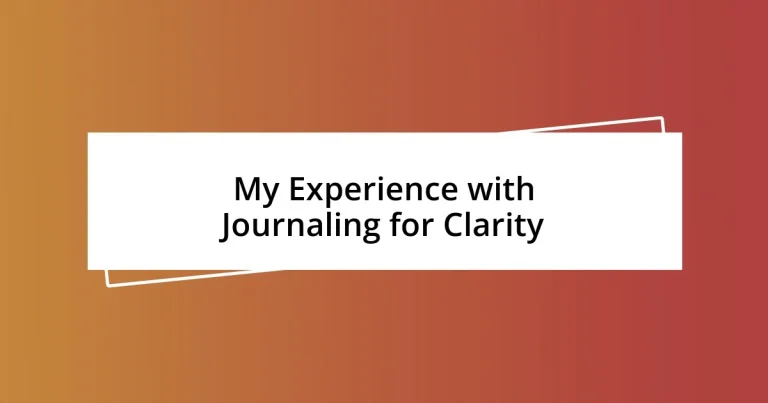Key takeaways:
- Journaling provides clarity by organizing chaotic thoughts, enhancing self-awareness, and improving decision-making skills.
- Utilizing various techniques, such as free writing and gratitude journaling, can lead to unexpected insights and personal growth.
- Consistency in journaling can be achieved by creating a dedicated routine, embracing flexibility, and overcoming self-doubt to foster a more meaningful practice.

Understanding the Purpose of Journaling
Journaling serves many purposes, but at its core, it’s about gaining clarity. I remember a time when I felt overwhelmed with decisions, and simply putting pen to paper helped me sort through my thoughts. Have you ever experienced that cathartic moment when your feelings finally spill out, making the chaos inside your head fade away?
For me, journaling is a tool for reflection. Each entry reveals patterns in my emotions that I hadn’t noticed before, like how I often dwell on the same concerns. I’ve often asked myself, “Why do these thoughts keep resurfacing?” The act of writing compels me to confront what’s really bothering me, prompting deeper self-exploration.
Ultimately, the purpose of journaling goes beyond just recording events; it’s about creating a space for honest dialogue with ourselves. There are nights I’ve written letters to my future self, sharing hopes and fears that felt too heavy to carry alone. Isn’t it fascinating how a simple act can transform confusion into a clearer path forward?

Benefits of Journaling for Clarity
Journaling is a powerful tool that fosters clarity in our chaotic lives. I discovered this firsthand during a particularly stressful project at work. I took a moment to jot down my thoughts, and to my surprise, I ended up outlining the entire project in my journal. The overwhelming noise in my head quieted, allowing me to focus on actionable steps instead of spiraling into anxiety.
One remarkable benefit of journaling is its ability to enhance self-awareness. In my experience, regularly documenting my feelings has helped me recognize triggers that lead to stress. I used to blame external circumstances, but as I reflected on my entries, I realized that some patterns stemmed from my own perceptions. This realization was liberating; I felt more in control of my responses and much more equipped to handle life’s challenges.
Additionally, journaling can improve decision-making skills. I’ve often found myself stuck between options, pondering the pros and cons without really getting anywhere. By laying out my thoughts in writing, I can visualize the possible outcomes, much like laying out a map for a road trip. This practice not only clarifies my priorities but also makes my choices feel more intentional.
| Benefit | Description |
|---|---|
| Enhanced Clarity | Journaling organizes chaotic thoughts into a coherent structure. |
| Increased Self-Awareness | Regular writing reveals patterns in emotions and triggers, transforming perceptions. |
| Improved Decision-Making | Visualizing thoughts in writing aids in evaluating options and outcomes. |

Types of Journaling Techniques
When exploring different journaling techniques, I’ve embraced a variety that each offers its own unique benefits. Some days I find solace in free writing, where I let my thoughts flow without judgment. It’s often surprising how a simple stream of consciousness can tap into feelings I didn’t even realize I was holding onto. Similarly, I’ve enjoyed gratitude journaling, which shifts my focus to appreciation. Listing what I’m thankful for not only uplifts my mood but also reminds me of the positive constants in my life, especially during challenging times.
Here are some popular journaling techniques that you might consider:
- Free Writing: Write continuously for a set time without worrying about grammar or structure.
- Gratitude Journaling: Dedicate time to list things you’re grateful for each day.
- Bullet Journaling: Use a customizable format to track tasks, thoughts, and habits.
- Prompt Journaling: Respond to specific prompts or questions, which can spark deeper reflection.
- Reflective Journaling: After an event, write about your thoughts and feelings to process the experience.
Experimenting with these techniques has led me to unexpected insights. For instance, I remember starting a bullet journal last year. Initially, it felt overwhelming to design, but soon it became a cherished routine that not only organized my tasks but also became a creative outlet. Each page was like a canvas where I could visualize my progress, making everyday stresses feel more manageable.

Creating a Consistent Journaling Routine
Creating a consistent journaling routine is something I’ve found incredibly beneficial in my own life. When I first started, I committed to just five minutes a day, thinking it wouldn’t take too much time but would still have an impact. Over time, I discovered that this small investment transformed into a meaningful ritual, allowing me to unwind and express thoughts I didn’t even know needed airing out. Have you ever felt the weight of unspoken thoughts? I sure have, and that’s where journaling became a welcome release.
Finding a specific time that worked for me was crucial for maintaining this habit. I chose mornings when my mind was still fresh, and my day hadn’t yet become cluttered. I fashioned my journaling corner—complete with a cozy chair and a warm mug of tea—and it turned into my sacred space for reflection. Creating an environment I looked forward to entering was key. Can you think of a space that sparks joy for you? When I step into mine, I feel like I’m entering a world where my thoughts matter.
Lastly, I leaned into the importance of flexibility with my routine. Some days, I might scribble thoughts out hurriedly, while other days I dive deeper—almost meditative in nature. Embracing that variety not only kept journaling fresh for me but also made it an enjoyable practice rather than a chore. Have you experienced the pressure to write perfectly? I realized perfection was the enemy of progress. By letting go of that expectation, I found joy in the act itself, knowing that every entry—regardless of length or style—held value.

Prompts to Enhance Your Clarity
When it comes to prompts that enhance clarity, I’ve found that specific questions often unlock deeper insights. For instance, asking myself “What am I feeling right now?” can lead to surprising revelations about my emotional state. I remember one day grappling with feelings of stress, and simply writing about it helped me pinpoint where those feelings originated. Have you ever noticed how just naming an emotion can alleviate the weight it carries?
Another prompt I frequently use is, “What do I want to achieve today?” This not only sets a clear intention but also recalibrates my focus. Once, after a particularly chaotic week, I wrote down a series of achievable tasks that seemed daunting at first, yet breaking them down made them feel manageable. Isn’t it empowering to realize that clarity is just a question away?
Lastly, I often ask, “What am I grateful for in this moment?” This prompt shifts my perspective and brings to light the simplicity of joy that exists in daily life. I recall one rainy afternoon where I felt downcast, and writing about the little things—a warm cup of coffee, the sound of the rain—reminded me of beauty in mundanity. Have you tried this approach? It never fails to ground me, allowing clarity to blossom amidst the noise.

Overcoming Common Journaling Challenges
Overcoming journaling challenges often starts with confronting the self-doubt that creeps in. I remember a particularly frustrating night when I sat down to write but felt completely blank. It took everything in me to remind myself that my journaling didn’t need to result in poetry or profound insights; the mere act of writing my thoughts was valuable. Have you ever felt that pressure? I learned that sometimes those empty pages lead to clearer skies once I let go of the expectation to write something “perfect.”
Another hurdle I faced was consistency during particularly busy weeks. There were days I skipped my journaling practice simply because I thought I didn’t have time. I overcame this by reframing my approach—I began to see journaling as a tool for unwinding rather than another task on my to-do list. I started keeping a small notepad with me, jotting down snippets of thoughts whenever I had a chance. Have you tried this flexibility? It made journaling feel less daunting and more spontaneous, helping me reclaim those small pockets of clarity throughout my day.
Also, I discovered that being too critical of my writing style stifled my creativity. Early on, I often edited myself while writing and ended up with unfinished entries. I found freedom in allowing my thoughts to flow without judgment. One memorable night, I scribbled pages full of unfiltered ideas—some coherent, some absurd—but every word felt liberating. Have you experienced this kind of release? Embracing that rawness not only helped me develop my voice but also deepened the clarity I sought, transforming journaling into a joyful conversation with myself.

Reflecting on Your Journaling Journey
Reflecting on my journaling journey has revealed so much about my inner landscape. One evening, as I flipped through old entries, I was struck by the patterns that emerged—recurring themes of fear and resilience. It made me realize how, despite the obstacles I faced, I always sought hope. Have you ever looked back at your journals and found threads of growth you didn’t fully appreciate in the moment?
In another instance, I stumbled upon a particularly raw entry from a challenging period in my life. Reading those words invoked a wave of nostalgia and gratitude. It reminded me that even the most difficult moments can serve as powerful teachers. This reflection has encouraged me to embrace my journey, imperfections and all. Isn’t it fascinating how reconnecting with our past selves can illuminate our present?
Sometimes, I set aside time to journal specifically about my progress, contemplating how far I’ve come. This practice not only fuels my motivation but also helps me re-evaluate my goals. I vividly remember when I made a significant career shift; writing about that leap and the fears surrounding it provided much-needed clarity. Have you ever considered how your journaling can evolve with you, capturing the essence of your journey and aspirations?













